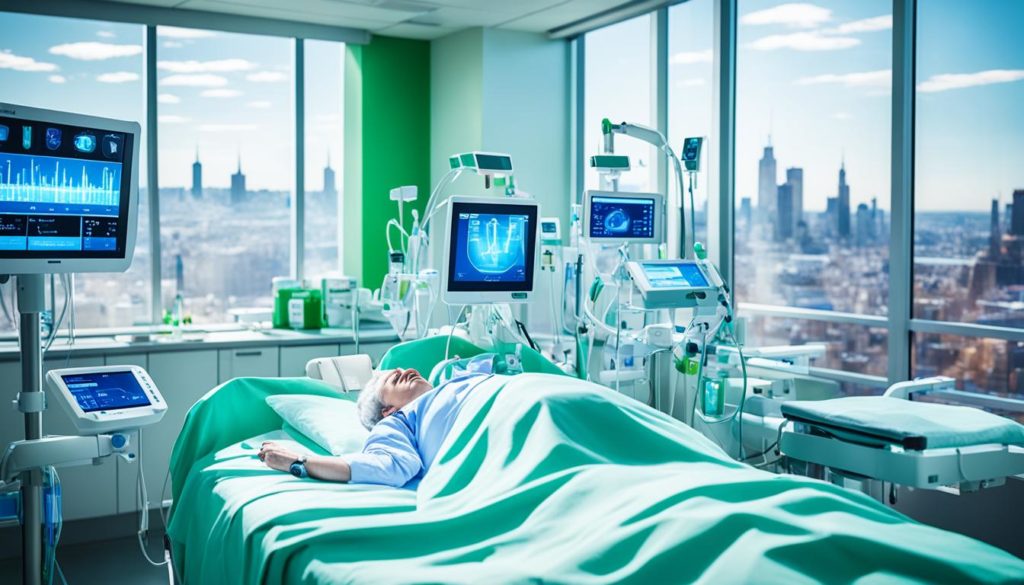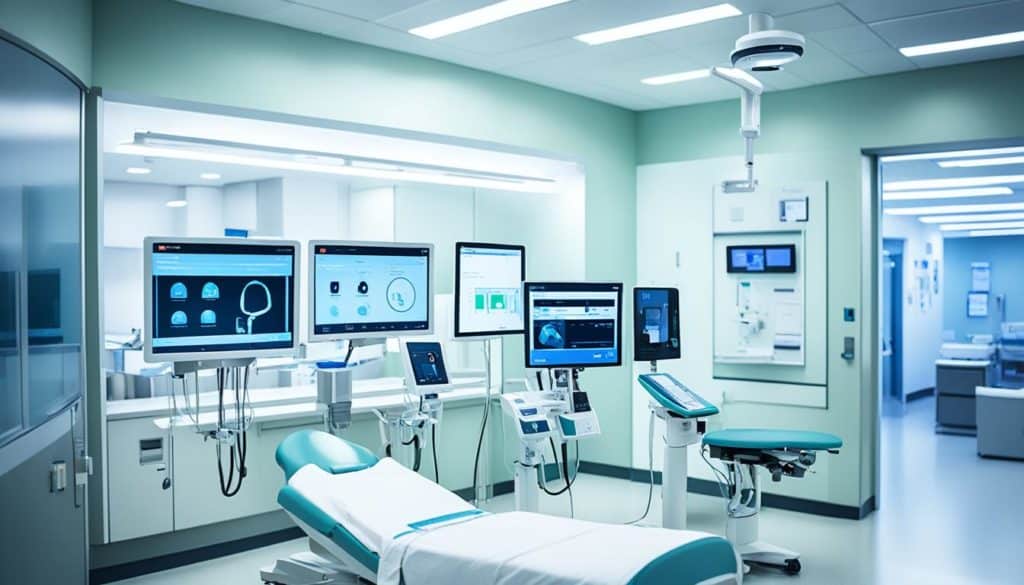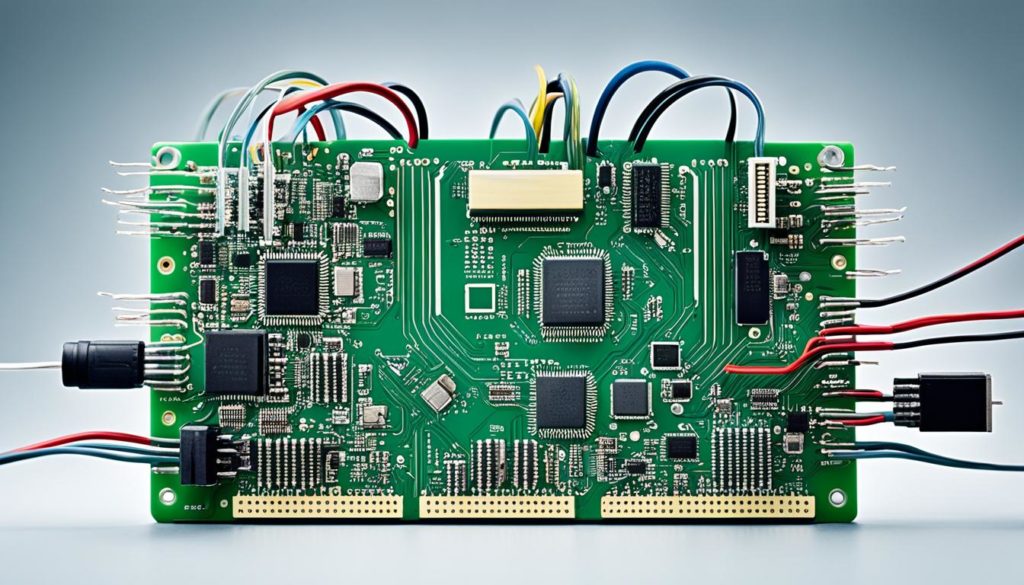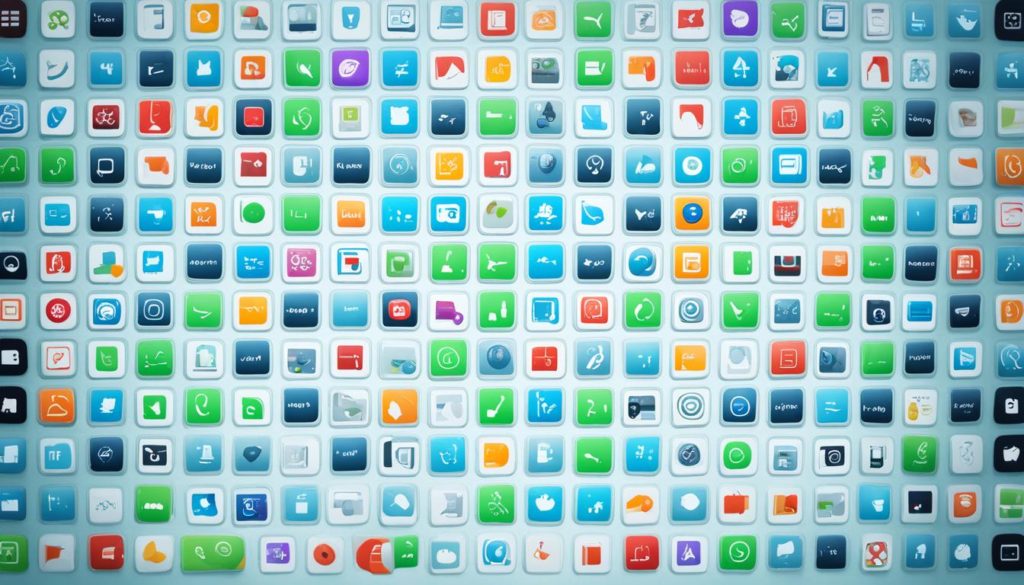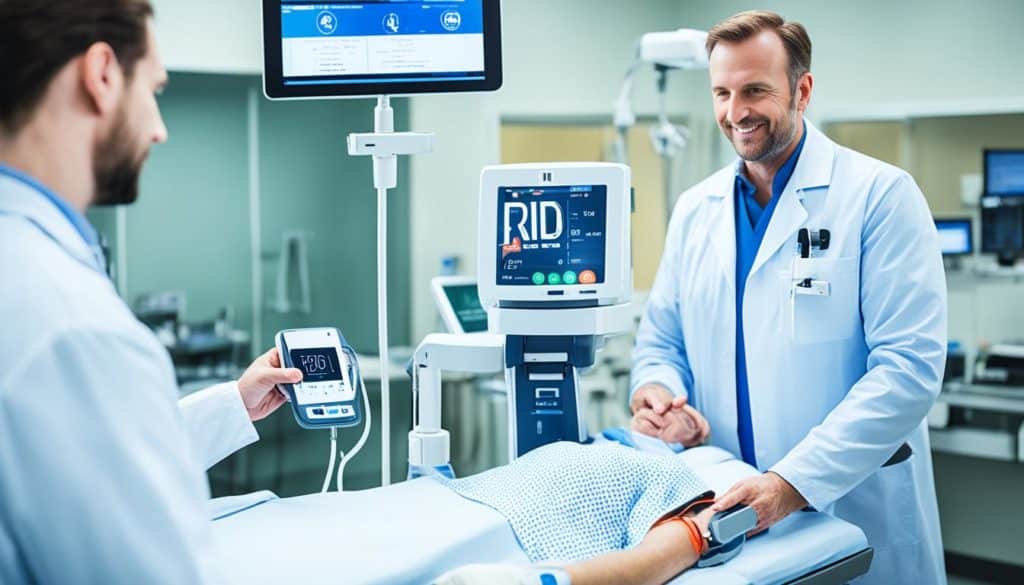
Did you know that RFID in healthcare can cut medication errors in hospitals by half? That’s right. This advanced technology is changing healthcare. It offers precise, real-time tracking and management of medical resources. Hence, RFID technology is a game-changer, making patient care safer and more effective than ever before.
Healthcare RFID solutions are known for their efficiency and accuracy. Thanks to initiatives like the HITECH Act, the healthcare industry is adopting this technology. It’s leading to fewer mistakes in identifying patients and handling medications. These benefits are not just about safety—they also improve how healthcare services are delivered. With the RFID market growing fast, investing in this technology means building a stronger, more dependable healthcare system.
Key Takeaways
- RFID technology in hospitals can reduce medication errors by up to 50%.
- Real-time tracking and management of medical resources enhance patient care.
- The HITECH Act underscores the importance of healthcare RFID solutions.
- RFID helps reduce misidentification and medical errors.
- Operational enhancements provided by RFID bolster healthcare efficiency.
- The global market for RFID in healthcare is expected to grow exponentially.
The Role of RFID in Modern Healthcare
RFID technology is changing healthcare in big ways. It started with tracking items and data using radio waves. Now, it ensures patients are safe and managed correctly. RFID systems have changed how healthcare works, making care better and places safer.
Introduction to RFID Technology
RFID stands for Radio-Frequency Identification. It uses electromagnetic fields to find and follow tags on objects. From warehouses to hospitals, RFID has grown. It lets tags talk to readers, sharing data without needing to see each other. RFID in healthcare means instant data and better management of it.
Applications of RFID in Healthcare Settings
RFID technology helps track patients in many healthcare places, like hospitals and clinics. Here are key uses:
- Patient Tracking: It makes sure patients are correctly identified, lowering mistakes and boosting safety.
- Asset Management: It keeps track of medical tools in real time, helping hospitals work better and use resources wisely.
- Medication Management: It watches over drug supplies, cutting down on mistakes and keeping patients safe.
- Access Control: It controls
- Surgical Instrument Tracking: It keeps an eye on surgery tools, avoiding loss and making sure they’re clean and ready.
In summary, RFID is making healthcare better, more efficient, and safer. It’s making care settings smarter and more secure.
Benefits of Using RFID in Healthcare
The allure of RFID in healthcare lies in its clear benefits. These benefits enhance the quality of patient care noticeably.
Improved Patient Safety and Care
RFID technology has made patient safety better by cutting down on medication mistakes. It also improves how patients are identified. For example, a study by Ku et al. (2011) showed patient verification jumped from 75% to 100% after implementing RFID.
Additionally, RFID lets hospital staff know about urgent issues quickly. This includes alarming situations like infant abductions. This quick response helps in prompt intervention and recovery. To grasp how RFID boosts patient safety and care, look at its high accuracy rates and fast notification systems. Learn more about RFID’s benefits.
Streamlined Operations and Efficiency
RFID tracking ups the speed of healthcare operations. It raises how often doctors complete time-outs from 43% to 70%. And it drops the loss of instruments from 0.146% to 0.089%, studies show. Plus, RFID is super accurate in event detection for monitoring.
RFID also makes admin tasks smoother and better hand washing practices. Accuracy in these practices was seen at around 93.5% and 92%. To see RFID’s role in making things run smoothly.
Cost Savings and Resource Management
Using RFID in healthcare means big cost savings and better resource use. In 2009, the U.S. spent $810 billion on healthcare. About 20-30% of that was due to poor quality care. RFID cuts waste from not using resources properly or inefficiency.
For example, RFID helped a North Carolina hospital stop potential abductions. It also managed inventory well, leading to lower costs and better use of materials and staff. The advantages of RFID tracking show in reduced operating expenses and smarter resource management.
Challenges and Barriers to RFID Implementation
RFID technology has huge potential in healthcare. Yet, its adoption faces hurdles. These include economic costs, technical issues, resistance from organizations, and privacy concerns. These barriers must be tackled for RFID to become widespread in healthcare.
Implementing RFID tagging, quaranting, activating, and deploying is costly. Active RFID tags range from $20 to $100, and passive tags cost $0.1 to $1.5 each. The lack of medications with RFID labels from manufacturers adds to the challenge.
Technical barriers also stand in the way. Different technology vendors struggle to work together because of interoperability issues. Standardizing RFID tag info and placement is hard. Also, materials like liquids and metals can disrupt RFID signals.
Change is hard for organizations. For RFID in healthcare to work, staff need to learn new skills. Detailed planning and cost-benefit analyses are necessary. Healthcare often finds it tough to blend new RFID technology with old systems.
Protecting patient info is critical with RFID. Unauthorized access and misuse of medical data are serious risks. Strong security measures are needed to guard this sensitive info. Overcoming these issues is key to successful RFID use in healthcare, as noted in this article.
Healthcare centers should learn about RFID before using it. Educating staff, focusing on economic and technical issues, and improving patient care are vital.
RFID in Healthcare
The healthcare world has seen big changes with RFID technology. It’s great for tracking in real time and boosts patient safety. RFID in the medical field helps manage patients, meds, and important equipment better.
Real-time tracking and monitoring
RFID makes tracking patients easy and accurate. Hospitals can watch patient movements closely. This is really important for patients who might get lost easily.
Not just people, but meds and equipment can be tracked too. Ensuring the right patient gets the right medicine at the right time. It also helps find medical tools fast, saving money and improving care.
Enhanced patient identification and security
RFID is also making patients safer. It helps prevent mix-ups with babies or stopping someone from taking a baby. ID bands with RFID tags make sure everyone is who they should be, everywhere in their care.
This tech keeps an eye on meds and tests too, making sure everything is safe and correct. RFID is all about keeping patients safe and making sure they get the care they need.
Conclusion
RFID technology is a big step forward for healthcare. It makes patient care safer and operations more efficient. Studies show it greatly reduces errors in labeling medical samples. This technology is always getting better, promising exciting new developments in healthcare.
RFID’s uses in healthcare are wide-ranging. They help track instruments and monitor patients in real time. This not only improves efficiency and cuts costs but also protects patients by ensuring they are correctly identified. One study noted a big leap in medication safety thanks to RFID.
There are some challenges with RFID, like security and how well it works with other systems. But the advantages far outweigh these problems. Hospitals using RFID see better patient care and satisfaction. Adopting RFID means investing in a future where technology greatly improves health care.
FAQ
What is RFID technology in healthcare?
RFID technology in healthcare means using radio waves to keep track of medical things. It tracks patients, meds, and other important stuff. This makes patient care better by giving instant info and making fewer mistakes.
How does RFID technology improve patient care?
RFID technology makes patient care better by cutting down on wrong meds. It helps identify patients correctly and keeps tabs on their movements and health signs. This leads to more precise medical records and better safety for patients.
What are the applications of RFID in healthcare settings?
RFID is used in healthcare for tracking patients and checking on med dosing. It also tracks equipment, manages inventory, and keeps newborns safe in maternity areas.
What are the benefits of using RFID in healthcare?
Using RFID in healthcare boosts patient safety and makes operations smoother. It leads to fewer mistakes and saves money by managing resources and improving efficiency.
What are the challenges to implementing RFID in healthcare?
Some challenges include the cost, technical issues, people not wanting to change, and privacy worries. Solving these problems involves looking at costs and benefits, training staff, and strong security actions.
How does RFID technology help with real-time tracking and monitoring?
RFID gives instant tracking and watching of patients, meds, and equipment. It ensures things are managed well and helps get needed care quickly, which makes patient care better.
How does RFID enhance patient identification and security?
RFID improves patient ID and security by making sure patients and their info and meds match up right. This lowers mistakes and boosts the quality of care.
Can RFID implementation lead to cost savings in healthcare?
Yes, putting RFID into use can save a lot of money by lowering waste, cutting mistakes, and better managing resources. This improves how well everything operates.
What preparatory steps should healthcare facilities take for RFID implementation?
Healthcare places should first look closely at costs and benefits. They need to teach their staff well and make solid plans for keeping info safe and private. This helps RFID work well and smoothly.
Future App Studios is an award-winning software development & outsourcing company. Our team of experts is ready to craft the solution your company needs.


